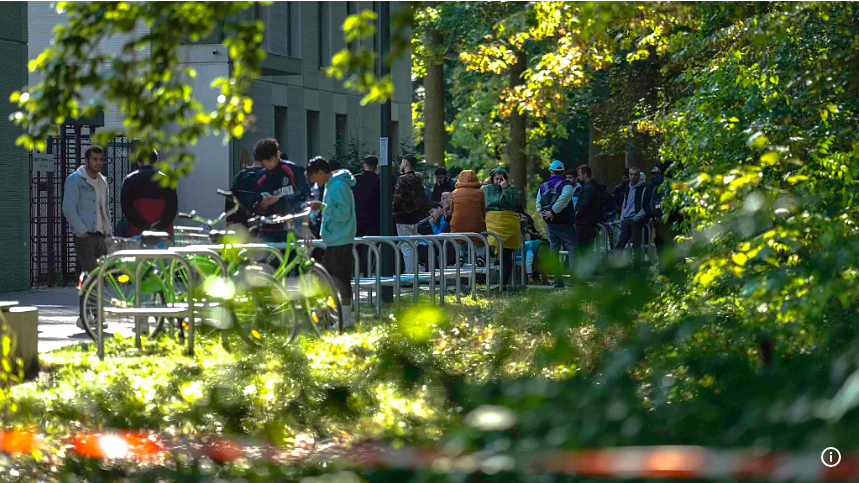"Germany Denies National Emergency Over Migration Amid Reports of Border Crackdown Plans"

Germany Denies Reports of Emergency Measures to Curb Migration Amid Political Tensions
Chancellor Friedrich Merz’s government refutes claims of invoking EU clause to tighten border controls
The German government on Thursday firmly denied a controversial media report claiming that Chancellor Friedrich Merz had declared a national state of emergency to address rising migration numbers. The report, published by Die Welt, alleged that the federal government was preparing to invoke Article 72 of the Treaty on the Functioning of the European Union (TFEU), a move that would significantly expand Germany’s ability to enforce stringent border controls and override EU asylum procedures.
Government spokesperson Stefan Kornelius swiftly debunked the claim. “The Chancellor is not declaring a national emergency,” he stated in response to mounting public speculation and concern. “There is no activation of Article 72, and the government remains committed to a balanced and lawful approach to border security and asylum policy.”
The Alleged Emergency Plan
According to Die Welt, the Merz administration was planning to use Article 72—a rarely invoked clause that allows national governments to override EU laws in matters of public order and internal security—to take unilateral control of its borders. If approved by Brussels, the move would allow Germany to implement emergency measures, including rejecting asylum applications at the border, increasing deportations, and suspending certain EU legal obligations.
The report also suggested that the Interior Ministry had briefed ambassadors from neighbouring countries, including Poland, Austria, and the Czech Republic, about the potential plan. However, no specific timeline or official decision was confirmed in the article.
Had it proceeded, this would have marked the first time Germany attempted to suspend EU asylum law—an unprecedented move for one of the founding members of the European Union. The clause was previously invoked by Italy in 2023 to tackle what it described as a “migration emergency.”
Interior Minister Backs Tougher Measures
While the Merz government denies any move to trigger Article 72, it has not shied away from tightening border security in other ways. Just one day after taking office, Interior Minister Alexander Dobrindt announced immediate steps to reinforce Germany’s border with neighbouring EU states.
“We will control the borders more strictly. This will also lead to a higher number of rejections,” Dobrindt said on Wednesday. The newly appointed minister emphasised that while Germany will step up deportations of irregular migrants—particularly those entering from so-called ‘safe EU countries’—the policy will still protect vulnerable populations, including children and pregnant women.
Dobrindt’s comments were met with swift backlash from both domestic and international observers. Governments in Poland and Austria raised concerns about the legal implications of Germany unilaterally turning back migrants, many of whom may still have valid asylum claims under EU law.

Legal and Political Implications
Migration has become a central issue in German politics following a surge in arrivals throughout 2024. While the numbers are still well below the 2015 peak, growing political pressure from right-wing and conservative factions has pushed the Merz government to adopt a firmer stance.
Legal experts, however, caution that attempts to override EU asylum law—particularly through measures as extreme as invoking Article 72—would face legal hurdles and political resistance within the EU.
“Article 72 is not a free pass for member states to do whatever they want at the border,” said Dr. Lena Hofmann, a professor of EU law at the University of Cologne. “It must be justified by serious threats to public order or internal security, and any measures taken must be proportionate and temporary.”
Brussels has yet to receive any formal request from Berlin related to emergency measures under Article 72, a European Commission spokesperson confirmed on Thursday.
A Political Balancing Act
Friedrich Merz, who won the chancellorship after years of internal CDU leadership struggles, is walking a political tightrope. On one hand, his government is under pressure from conservative voters and coalition partners to adopt tougher migration policies. On the other hand, he must avoid alienating centrist and pro-EU factions within Germany and across the bloc.
Thursday’s denial appears to be an attempt to calm rising political tensions without fully stepping back from plans to make border enforcement a top priority. The Merz administration is expected to unveil a broader immigration policy package in the coming weeks, which may include new legislation aimed at streamlining deportations, boosting border staffing, and improving migrant processing times.
Europe Watching Closely
As the EU continues to grapple with uneven migration flows and political divisions over burden-sharing, Germany’s actions are being closely monitored. With its economic and political weight, Germany’s stance on migration often sets the tone for the rest of the continent.
While the latest reports appear to be false or premature, they underscore the deep anxieties and high political stakes surrounding migration policy—not just in Germany, but across Europe.
For now, the focus returns to Berlin, where Chancellor Merz and his cabinet face the challenge of balancing public concern, legal obligations, and European unity. Whether this balancing act will succeed remains to be seen, but one thing is clear: the debate over how to manage migration in Europe is far from over.
- Art
- Causes
- Crafts
- Dance
- Drinks
- Film
- Fitness
- Food
- Игры
- Gardening
- Health
- Главная
- Literature
- Music
- Networking
- Другое
- Party
- Religion
- Shopping
- Sports
- Theater
- Wellness


